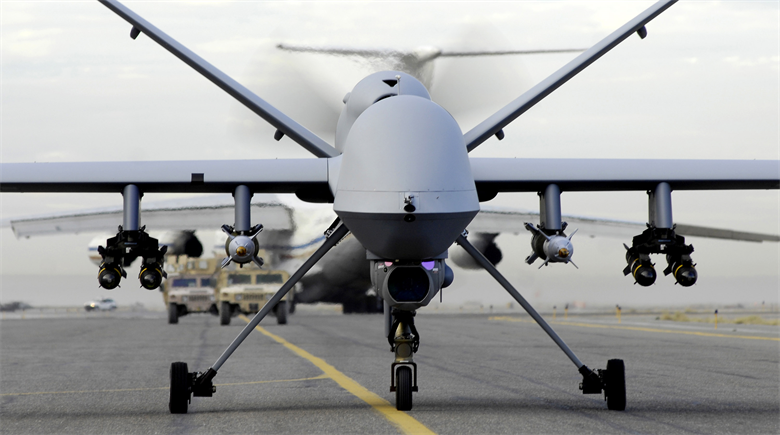Trump administration’s move away from transparency may undermine US military operations
Posted By Megan Karlshoej-Pedersen on May 6, 2019 @ 12:46

In early March, President Donald Trump caused a furore when he revoked a requirement [1] for the US intelligence community to report on civilian casualties in airstrikes outside war zones. The decision is the latest in a larger trend of the Trump administration’s undermining the mechanisms of oversight for the use of force abroad. While these developments have received much attention for depriving defence reporters of access to their usual Pentagon contacts, they also limit the public’s and the legislative branch’s access to information, which could have negative effects on US military operations more broadly.
When you examine the drivers of the current military engagements of the US and its allies, the lack of transparency may seem like a natural development. In the aftermath of the large-scale interventions in Iraq and Afghanistan, in which attempts at nation-building were largely judged to have failed, Western governments have struggled to find new ways to deal with threats abroad without risking public and legislative outrage.
What has emerged is an approach that the Oxford Research Group refers to as ‘remote warfare [2]’, in which local forces do the bulk of the frontline fighting, backed by special forces operations and by air support, training and equipment from Western militaries. It’s perhaps a predictable consequence of 21st century operations that transparency would suffer. And it has. But for no good reason.
The probable fallouts of Trump’s new policies could severely impair the US’s ability to achieve its national objectives abroad.
Deniability and diminished transparency may be perceived to bring flexibility and allow the government to avoid public scrutiny. But our research suggests [3] that it’s not a simple relationship. More secrecy does not automatically translate into greater strategic advantages. In fact, in an age in which both enemy forces and civilian witnesses have cameras and Wi-Fi, building policies on the assumption of complete secrecy is increasingly untenable—and government control of the narrative will be the first to suffer.
While control of information and disinformation has always played a role in warfare, in modern operations there’s a widespread notion [4] that the battles over control of the narrative are as important as those on the battlefield. This sentiment is perhaps best captured in the arguments of US Army General David Petraeus and others about winning ‘hearts and minds’; for example, Petraeus once said [5] that the US must ‘[r]ealize that we are in a struggle for legitimacy that will be won or lost in the perception of the Iraqi people’.
In repealing the requirement to report on casualties—civilian, but also militants—of the intelligence agencies’ drone strikes in non-combat zones, Trump has willingly allowed others to take over the narrative. Which of course they will, as they have so many times before [6]. Ned Price, a CIA National Security Council spokesman under Barack Obama, made the same point recently [7]: ‘This requirement was about more than transparency. It allowed, for the first time, the US to counter disinformation from terrorist groups with facts about the effectiveness and precision of our operations. It was an important tool that we’re again without.’
Decreasing transparency over the use of remote warfare also has the detrimental effect of preventing the legislative branch of government from playing the important role [8] of ensuring that methods of engagement—be they drones or special operations forces—are chosen on the basis of their strategic advantage rather than the immediate short-term results. This is particularly significant in remote warfare, where the ability to deploy drones, which are often seen as ‘clean’ and ‘cheap’ tools [9], without significant oversight creates a risk that they’ll be used because they’re the most politically expedient option, rather than because they’re the best possible response to insecurity. Oversight mechanisms help to ensure that the right questions are asked about strategy and the objectives of such deployments before the damage gets done.
Such mechanisms could potentially help prevent the kind of neck-breaking strategic changes [10] that we saw on the African continent following the deaths of four US Special Operations soldiers in Niger in late 2017. Arguably, it was the shock expressed by the American people (and government) at the US presence in this relatively unknown battle in the wider war on terror that caused the US to suddenly abandon [10] its strategy of deploying troops and focus instead on operating an increasing number of drones [11] in the area—a choice that is likely to create more discontent [12] and to be used as recruitment material for the Islamists that the US is there to fight.
This is not to say that there should be full transparency over American engagement in current wars. It’s simply that many of the transparency and oversight mechanisms that Trump is undermining or even abolishing have been in place for years—in some cases decades [13]—and have never been directly linked with national security crises. Removing them seems counterproductive. Not only does it undermine democratic institutions, it also risks undermining US foreign policy more broadly, by handing the reins of the narrative over to the adversary and bypassing the mechanisms that could stop short-term decisions from trumping strategic considerations.
Article printed from The Strategist: https://aspistrategist.ru
URL to article: /trump-administrations-move-away-from-transparency-may-undermine-us-military-operations/
URLs in this post:
[1] revoked a requirement: https://www.defenseone.com/news/2019/03/how-many-civilians-die-covert-us-drone-strikes-it-just-got-harder-say/155355/?oref=defenseone_today_nl
[2] remote warfare: https://www.oxfordresearchgroup.org.uk/Handlers/Download.ashx?IDMF=4026f48e-df60-458b-a318-2a3eb4522ae7
[3] research suggests: https://www.oxfordresearchgroup.org.uk/Handlers/Download.ashx?IDMF=ef962603-0b99-4beb-9902-c3f85c7a83ff
[4] notion: https://www.oxfordresearchgroup.org.uk/Handlers/Download.ashx?IDMF=7b664721-ea08-44e3-981e-12e25debd2bf
[5] once said: https://www.tandfonline.com/doi/pdf/10.1080/09546550902950316
[6] as they have so many times before: https://www.scmp.com/news/world/united-states-canada/article/2135909/chilling-helmet-cam-video-stolen-dead-us-soldier
[7] made the same point recently: https://twitter.com/nedprice/status/1103356063523442695
[8] important role: https://www.oxfordresearchgroup.org.uk/britains-shadow-army-policy-options-for-external-oversight-of-uk-special-forces
[9] ‘clean’ and ‘cheap’ tools: https://www.oxfordresearchgroup.org.uk/blog/the-true-cost-of-drone-warfare
[10] kind of neck-breaking strategic changes: https://www.nytimes.com/2018/08/01/world/africa/us-withdraw-troops-africa.html?rref=collection%2Fsectioncollection%2Fworld
[11] an increasing number of drones: https://www.nytimes.com/2018/04/22/us/politics/drone-base-niger.html
[12] more discontent: https://theintercept.com/2018/02/18/niger-air-base-201-africom-drones/
[13] decades: https://www.politico.com/story/2018/07/26/pentagon-media-access-restricted-743347
Click here to print.